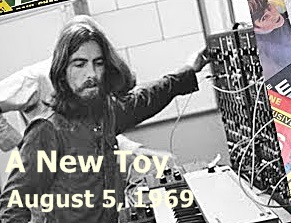August 5 Musicology
If you’re a fan of musical diversity, the events of August 5 on the musical calendar should delight you. We have an Oscar winning song, a country music superstar’s first hit, a song that took up both sides of a 45-rpm, the release of an iconic (an understatement of epic proportions) album, the introduction of a new instrument, the biggest hit in Wayne Newton’s career, the first major solo smash by Kenny Rogers, and the passing of a 60s-era bass guitar hero.
On August 5, 1956 (64 years ago today!), Doris Day was at #1 on the UK singles chart with Que Sera, Sera (Whatever Will Be Will Be).
The Oscar-winning song was featured in Alfred Hitchcock’s 1956 film, The Man Who Knew Too Much, with James Stewart and Day in the lead roles.
It peaked at #2 on the Billboard Hot 100.
On August 5, 1957 (63 years ago today!), the self-titled debut album by Patsy Cline was released, which would be one of three studio albums Cline would record during her lifetime.
The album produced the hit single Walkin’ After Midnight which reached #2 on the Billboard Country Songs chart and #12 on the Billboard Hot 100.
On August 5, 1959 (61 years ago today!), the Isley Brothers released Shout.
The song was too long (4 minutes, 25 seconds) for radio stations in those days so the single was split over both sides of the record as Part 1 and Part 2. Today, you’re going to get the two parts together.
The single reached #47 on the Billboard Hot 100, becoming the group’s first chart hit, and later the brothers’ first gold single.
On August 5, 1966 (54 years ago today!), the Beatles released Revolver on EMI’s Parlophone label in England.
The four “lovable mop tops” of just two years earlier were gone, replaced by bold, groundbreaking, experimental innovators.
Recorded between April 6 and June 21, the first recordings released from those sessions were the single Paperback Writer / Rain, an indication of what was to come.
Three of the album’s songs (I’m Only Sleeping, And Your Bird Can Sing and Doctor Robert were outrageously omitted from Capitol’s U.S. version released on August 8.
It marked the final time Capitol issued an altered UK Beatles album for the North American market. When the Beatles re-signed with EMI in January 1967, their contract stipulated that Capitol could no longer alter the track listings of their albums.
What had been demanded or expected from them as entertainers and popular musicians was something they had challenged from their first cheeky, flippant interviews, but with Revolver they were no longer mere anomalies within the world of pop, no longer potential fads; they were avatars for a transformative cultural movement.
On August 5, 1969 (51 years ago today!), George Harrison brought his newly acquired Moog synthesizer into the Abbey Road studio to use in finishing Because for the Abbey Road album.
“I had to have mine made specially,” Harrison said of his new toy. “Mr. [Robert] Moog had only just invented it. It was enormous, with hundreds of jack plugs and 2 keyboards.”
You can hear Harrison playing a quick bridge at 1:30 and again with a different sound beginning at 2:12 to the end of the song.
The song was inspired by Beethoven’s Moonlight Sonata and came about quite by accident.
Yoko Ono was a classically trained pianist. She was playing Beethoven’s Piano Sonata No. 14 in C-sharp minor, Op. 27, No. 2 – the Moonlight Sonata.
Lying on their sofa listening, John Lennon asked her to play the chords backwards, and wrote Because based on that. While not an exact reversal of Beethoven’s piece, it contains a number of musical similarities.
Triple Tracking Factoid: Producer George Martin had Lennon, Harrison and Paul McCartney record their vocals three times each, creating a nine-voice harmony that was extraordinary.
On August 5, 1972 (48 years ago today!), Wayne Newton achieved his biggest hit when the million selling Daddy Don’t You Walk So Fast hit #1 on the Cashbox chart.
It would later reach #1 in Australia and #3 in Canada. It peaked at #4 on the Billboard Hot 100, marking the only time Newton cracked the Top Ten.
On August 5, 1976 (44 years ago today!), Kenny Rogers recorded Lucille at Nashville’s American Studio.
An international hit, it reached #1 on the Billboard Country Singles chart and #5 on the Billboard Hot 100. It also reached #1 in Canada, South Africa and Yugoslavia, and peaked at #2 in Ireland.
It became Rogers’ first major hit as a solo artist after leaving the successful country/rock group The First Edition the previous year.
On August 5, 1993 (27 years ago today!), Randy Hobbs, bassist for the McCoys on their 1965 #1 hit, Hang On Sloopy, died of heart failure at the age of 45.
His passing was no doubt related to his over the top drug use during his rock and roll career
Hobbs’ death came on the 46th birthday of McCoys’ lead singer and guitarist, Rick Derringer.
Recalling Hobbs death, Derringer talked about the protracted decline of the man he called one of the best bass guitar players ever.
“We were dabbling in drugs but [Randy] was swimming in an ocean of them. He later played with Johnny Winter but that ended because his drug intake had gotten so drastic that his bass playing had gone way down. He was just simply out of control.”
